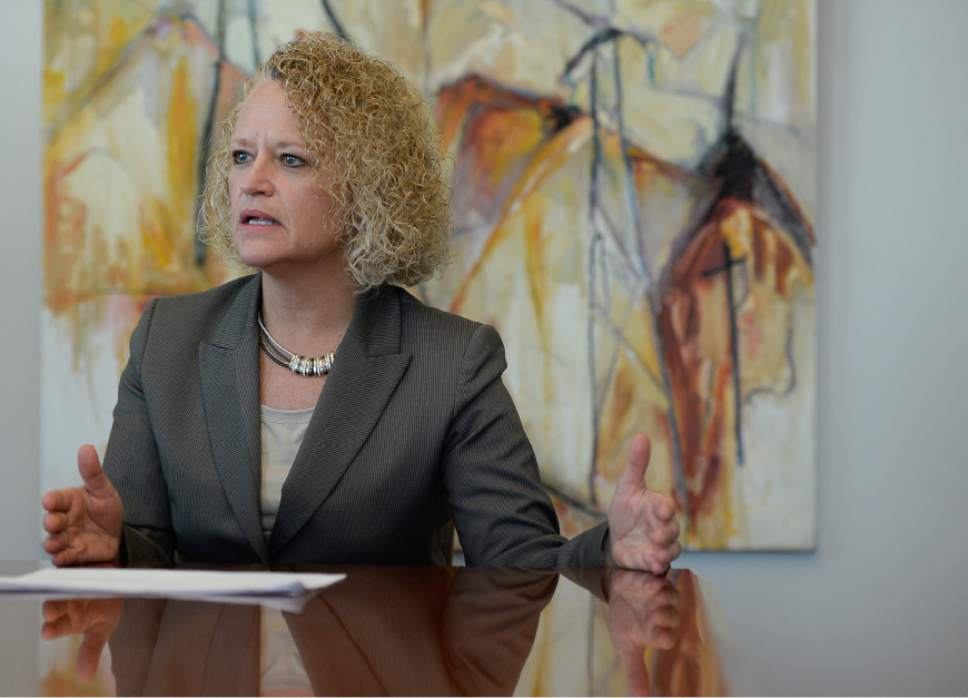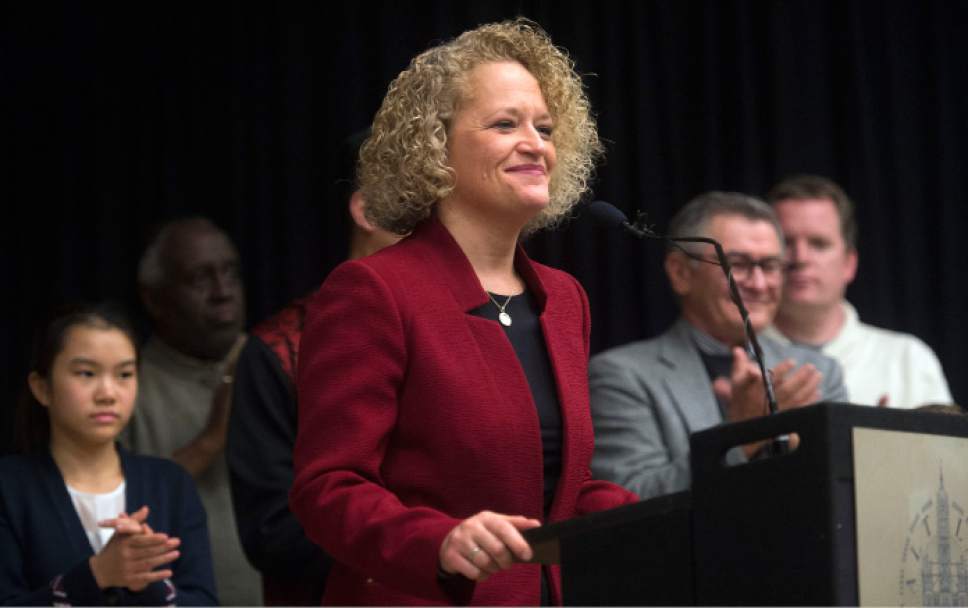This is an archived article that was published on sltrib.com in 2017, and information in the article may be outdated. It is provided only for personal research purposes and may not be reprinted.
Salt Lake City's mayor pitched a budget Tuesday that would boost funding for homeless services and affordable housing, and that tees up a debate about the future of the city's golf courses.
Although Jackie Biskupski's stated priorities hew to those identified earlier this year by the City Council, there promises to be robust discussion between the mayor's office and council members about the wisdom of bonding and the appropriateness of earmarking $400,000 in general-fund money for the Rose Park Golf Course.
Council members said after Biskupski addressed them Tuesday that they'd require more time to drill into the details of her plan, which, as expected, calls for increases in sewer and water rates that officials have said are required for necessary upgrades. The council will accept public comment on the proposed budget May 16, May 23 and June 6.
Among the provisions Biskupski highlighted were $2.1 million for homeless services, an additional $3 million for affordable housing and more than $8 million for rundown streets.
Biskupski also recommended using $400,000 in general funds to prop up the Rose Park Golf Course, one of six municipal courses that were on track to lose a combined $1 million when city staff briefed the council earlier this year.
Dipping into general funds for golf was a nonstarter, council members told city staff, but Biskupski has reframed the Rose Park course as a "community asset" that will combine with the Regional Athletic Complex and Jordan River Disc Golf Course to form a broader "northwest recreation area."
A city worksheet said the course could be expanded to include a multiuse complex, bike rentals, canoe and raft launching, and nature and biology education programs.
"I appreciate that the mayor's being creative about how to pencil golf this year," said Councilman Derek Kitchen. "We all want to save golf as best as possible. I think the reality is we're faced with a pretty dire situation with declining users and years of years of deferred maintenance that have not been addressed, as far as I can tell in this budget, and so we'll see."
Another possible point of contention is the mayor's request that the council resist the temptation to bond for street upgrades. The city's engineering department has rated two-thirds of the capital's streets as poor, and the council has rated it a top legislative priority.
"The best time to bond was last year, the next-best time is this year, a less good time is next year," said Councilwoman Lisa Adams, referring to historically low rates.
But Biskupski asked that they wait until next year, when the city will retire existing debts in its capital improvement program.
"This consideration is influenced greatly by trying to avoid additional tax burden on city residents," she said.
In the meantime, Biskupski said the city would reallocate $1.9 million for "shovel-ready projects," prioritizing road repairs. The mayor budgeted $8 million in total spending on roads, sidewalks and streets.
That's about a quarter of what's needed, Adams said, adding, "We'll be looking to find a way to really move the ball down the field on infrastructure."
The two bodies appear to be more synced on homeless services and affordable housing.
The mayor's budget features a more than $1.5 million increase in ongoing funding for homeless services.
The city would also match the county's $685,000 funding for "Operation Diversion." The initiative — focused on the area around a downtown homeless shelter — urges lawbreakers with addictions or mental illness to undergo treatment. Biskupski would set aside an additional $220,000 to fund related social work at the police department's nearby Community Connection Center.
Another $125,000 would go toward housing homeless people who use the most city resources.
Tuesday also saw the mayor present her budget for the Redevelopment Agency.
Once again, Biskupski asked that the council — which doubles as the RDA's board of directors — be cautious about taking on additional debt.
"I am concerned that bonding would continue to slow critical projects at a time when we have enough cash on hand to aggressively move forward with consideration to staffing and construction capacity," she said.
Biskupski's proposal would add $3 million for affordable housing to $21 million set aside by the council last October.
Biskupski also suggested that the council consider a "phased-in approach" to a request from the city's library officials for an increase in property taxes — about $20 per taxpayer — which they say are needed for updates to older branches.
"I do have concerns regarding the tax coming all at once," said Biskupski — pointing to the city's scheduled series of increases for sewer and water rates.
Sewer rates would increase by 30 percent this year and are expected to more than double over the next five years, while water rates are expected to increase 5 percent per year.
The city anticipates an increase of $2.9 million in sales-tax revenue and $800,000 in internet sales-tax revenue.
Nonunion employees would receive a raise of 1 to 2 percent, slightly under the rate of inflation for a second consecutive year, in the mayor's budget.
Biskupski ended her proposal by requesting that residents call their congressional delegation and emphasize the importance of the Department of Housing and Urban Development amid $6 billion in proposed cuts.
"This is your money," she said. "Help keep it in your community."
Twitter: @matthew_piper





